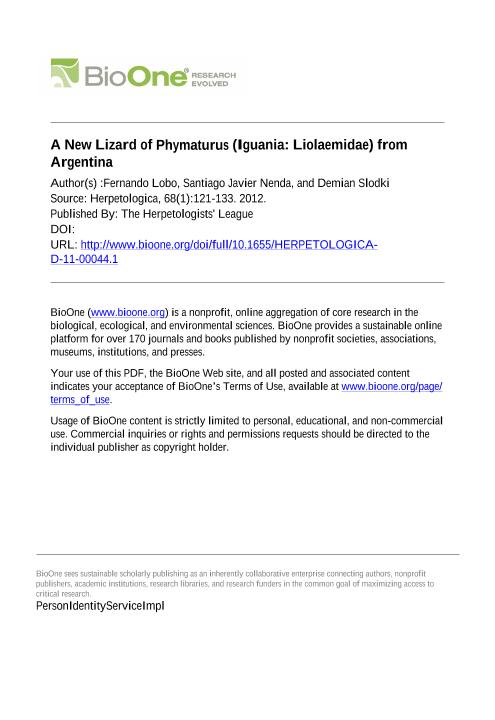Mostrar el registro sencillo del ítem
dc.contributor.author
Lobo Gaviola, Fernando Jose

dc.contributor.author
Nenda, Santiago Javier

dc.contributor.author
Slodki, Demián Jorge

dc.date.available
2017-05-22T22:10:04Z
dc.date.issued
2012-03
dc.identifier.citation
Lobo Gaviola, Fernando Jose; Nenda, Santiago Javier; Slodki, Demián Jorge; A new lizard of Phymaturus (Iguania: Liolaemidae) from Argentina; Herpetologists League; Herpetologica; 68; 1; 3-2012; 121-133
dc.identifier.issn
0018-0831
dc.identifier.uri
http://hdl.handle.net/11336/16844
dc.description.abstract
In this study, we describe a new taxon for the genus Phymaturus from the Sierra Laguna Blanca, Catamarca Province, Argentina. This area is known to be an isolated part of the Puna region where other endemic species of vertebrates occur. This new species of lizard belongs to the palluma group because it exhibits juxtaposed superciliary scales, rugose caudal scales, and typically a fragmented subocular scale. Also, this new Phymaturus is assignable, within the palluma group, to the northern or Puna clade because it presents the typical “spray” pattern and brown tails in males, which are distinct from the dorsal-reticulated pattern and yellow tails in species of the southern palluma group. It differs from its relatives in the Puna clade by having the following combination of characters: scapular spot present (more conspicuous in juveniles and females), yellow color in flank of females, males without enlarged scales on ventral surface of the base of tail, males with dark brown throat, enlarged scales on borders of posterior gular fold inconspicuous, ringed tails in both sexes, incomplete pigmentation over dorsum of neck, diffuse white transverse stripes over dorsum of body in females, absence of vertebral stripe, and in some specimens a divided rostral scale. Finally, we present new characters to be considered in future studies of Phymaturus systematics.
dc.format
application/pdf
dc.language.iso
eng
dc.publisher
Herpetologists League

dc.rights
info:eu-repo/semantics/openAccess
dc.rights.uri
https://creativecommons.org/licenses/by-nc-sa/2.5/ar/
dc.subject
Catamarca
dc.subject
Argentina
dc.subject
Liolaemidae
dc.subject
New Species
dc.subject.classification
Zoología, Ornitología, Entomología, Etología

dc.subject.classification
Ciencias Biológicas

dc.subject.classification
CIENCIAS NATURALES Y EXACTAS

dc.title
A new lizard of Phymaturus (Iguania: Liolaemidae) from Argentina
dc.type
info:eu-repo/semantics/article
dc.type
info:ar-repo/semantics/artículo
dc.type
info:eu-repo/semantics/publishedVersion
dc.date.updated
2017-05-22T20:48:34Z
dc.journal.volume
68
dc.journal.number
1
dc.journal.pagination
121-133
dc.journal.pais
Estados Unidos

dc.description.fil
Fil: Lobo Gaviola, Fernando Jose. Consejo Nacional de Investigaciones Científicas y Técnicas. Centro Científico Tecnológico Conicet - Salta. Instituto de Bio y Geociencias del Noa. Universidad Nacional de Salta. Facultad de Cs.naturales. Museo de Cs.naturales. Instituto de Bio y Geociencias del Noa; Argentina
dc.description.fil
Fil: Nenda, Santiago Javier. Consejo Nacional de Investigaciones Científicas y Técnicas. Oficina de Coordinación Administrativa Parque Centenario. Museo Argentino de Ciencias Naturales "Bernardino Rivadavia"; Argentina
dc.description.fil
Fil: Slodki, Demián Jorge. Consejo Nacional de Investigaciones Científicas y Técnicas. Centro Científico Tecnológico Conicet - Salta. Instituto de Bio y Geociencias del Noa. Universidad Nacional de Salta. Facultad de Cs.naturales. Museo de Cs.naturales. Instituto de Bio y Geociencias del Noa; Argentina
dc.journal.title
Herpetologica

dc.relation.alternativeid
info:eu-repo/semantics/altIdentifier/doi/http://dx.doi.org/10.1655/HERPETOLOGICA-D-11-00044.1
dc.relation.alternativeid
info:eu-repo/semantics/altIdentifier/url/http://www.bioone.org/doi/abs/10.1655/HERPETOLOGICA-D-11-00044.1
Archivos asociados
